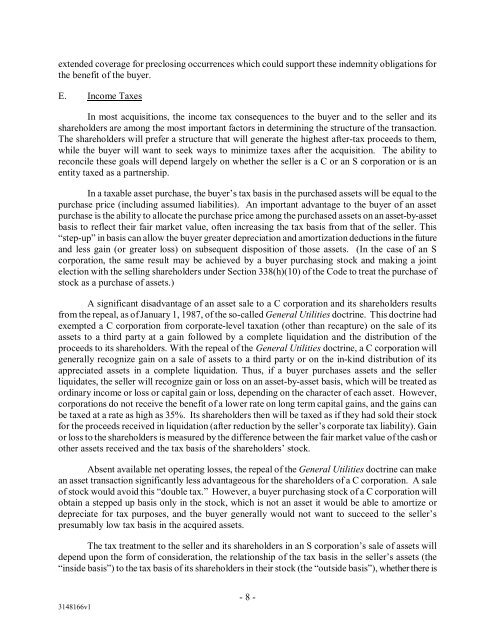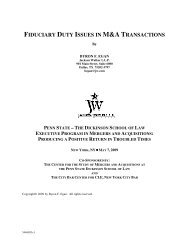asset acquisitions - Jackson Walker LLP
asset acquisitions - Jackson Walker LLP
asset acquisitions - Jackson Walker LLP
You also want an ePaper? Increase the reach of your titles
YUMPU automatically turns print PDFs into web optimized ePapers that Google loves.
extended coverage for preclosing occurrences which could support these indemnity obligations forthe benefit of the buyer.E. Income TaxesIn most <strong>acquisitions</strong>, the income tax consequences to the buyer and to the seller and itsshareholders are among the most important factors in determining the structure of the transaction.The shareholders will prefer a structure that will generate the highest after-tax proceeds to them,while the buyer will want to seek ways to minimize taxes after the acquisition. The ability toreconcile these goals will depend largely on whether the seller is a C or an S corporation or is anentity taxed as a partnership.In a taxable <strong>asset</strong> purchase, the buyer’s tax basis in the purchased <strong>asset</strong>s will be equal to thepurchase price (including assumed liabilities). An important advantage to the buyer of an <strong>asset</strong>purchase is the ability to allocate the purchase price among the purchased <strong>asset</strong>s on an <strong>asset</strong>-by-<strong>asset</strong>basis to reflect their fair market value, often increasing the tax basis from that of the seller. This“step-up” in basis can allow the buyer greater depreciation and amortization deductions in the futureand less gain (or greater loss) on subsequent disposition of those <strong>asset</strong>s. (In the case of an Scorporation, the same result may be achieved by a buyer purchasing stock and making a jointelection with the selling shareholders under Section 338(h)(10) of the Code to treat the purchase ofstock as a purchase of <strong>asset</strong>s.)A significant disadvantage of an <strong>asset</strong> sale to a C corporation and its shareholders resultsfrom the repeal, as of January 1, 1987, of the so-called General Utilities doctrine. This doctrine hadexempted a C corporation from corporate-level taxation (other than recapture) on the sale of its<strong>asset</strong>s to a third party at a gain followed by a complete liquidation and the distribution of theproceeds to its shareholders. With the repeal of the General Utilities doctrine, a C corporation willgenerally recognize gain on a sale of <strong>asset</strong>s to a third party or on the in-kind distribution of itsappreciated <strong>asset</strong>s in a complete liquidation. Thus, if a buyer purchases <strong>asset</strong>s and the sellerliquidates, the seller will recognize gain or loss on an <strong>asset</strong>-by-<strong>asset</strong> basis, which will be treated asordinary income or loss or capital gain or loss, depending on the character of each <strong>asset</strong>. However,corporations do not receive the benefit of a lower rate on long term capital gains, and the gains canbe taxed at a rate as high as 35%. Its shareholders then will be taxed as if they had sold their stockfor the proceeds received in liquidation (after reduction by the seller’s corporate tax liability). Gainor loss to the shareholders is measured by the difference between the fair market value of the cash orother <strong>asset</strong>s received and the tax basis of the shareholders’ stock.Absent available net operating losses, the repeal of the General Utilities doctrine can makean <strong>asset</strong> transaction significantly less advantageous for the shareholders of a C corporation. A saleof stock would avoid this “double tax.” However, a buyer purchasing stock of a C corporation willobtain a stepped up basis only in the stock, which is not an <strong>asset</strong> it would be able to amortize ordepreciate for tax purposes, and the buyer generally would not want to succeed to the seller’spresumably low tax basis in the acquired <strong>asset</strong>s.The tax treatment to the seller and its shareholders in an S corporation’s sale of <strong>asset</strong>s willdepend upon the form of consideration, the relationship of the tax basis in the seller’s <strong>asset</strong>s (the“inside basis”) to the tax basis of its shareholders in their stock (the “outside basis”), whether there is3148166v1- 8 -
















